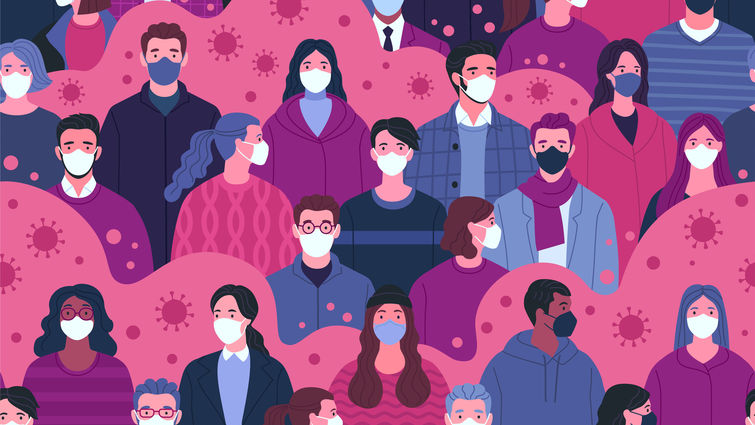
Approximately a year and a half after parts of the United States began to go into lockdown due to the spread of COVID-19, some experts like those at the World Health Organization are saying COVID-19 will probably “stay with us,” and evolve similarly to flu viruses.
COVID-19 an endemic?
Jennifer Veltman, MD, chief of infectious diseases at Loma Linda University Health, says if not eradicated — no longer circulating among the population — the COVID-19 virus could remain as an ongoing endemic. “That means it’s just always with us and doesn’t go away,” she says.
Two examples of eradicated viruses include the Ebola outbreak that occurred in 2014, and the first SARS outbreak in 2003. “Although both those viruses still have animal reservoirs, meaning there is potential for future outbreaks, they’re not circulating currently,” she says.
In contrast, influenza, which first originated in the early 1900s with a high case fatality rate, is an example of an endemic virus that still circulates annually. “We don’t know yet if coronavirus will pick a season so to speak or if it will just spread constantly throughout the year,” Veltman says.
Longterm impact on communities
As for how that will impact communities, Veltman says it puts people with compromising health conditions in an especially difficult spot long-term. “I think healthcare professionals were really hoping that this virus would go away, especially for people needing organ transplants, patients going through cancer treatments, and those on immunosuppressive medications,” she says.
However, if COVID-19 becomes endemic, those individuals have not been shown to receive as strong of an immune response from the vaccine. “I think those people and those around them may need to continue with some protective measures such as masking, social distancing, and avoiding large crowds, and unfortunately that also means that healthcare workers will need to continue to wears masks when caring for them,” Veltman says.
More manageable over time?
At the very least, like H1N1 or the 2009 Swine Flu, experts seem hopeful that COVID-19 could become a more manageable threat over time. “At the beginning of the pandemic, we were trying to use completely ineffective tools like hydroxychloroquine and some HIV medicines that are not effective at all, we learned afterward,” she says. “We were throwing inadequate, sometimes useless things at the virus, trying to understand what worked. Now we have better tools in our toolbox.”
From using steroids for hypoxic patients to reduce mortality, to administering remdesivir to shorten hospital duration and get people on the road to recovery, Veltman says providers now have more effective ways to treat patients with COVID-19 and reduce the burden on the healthcare system and risk of death.
While it’s hard to predict whether COVID-19 could potentially become less deadly over time due to viral mutations, Veltman is hopeful that as time goes on, more effective treatments will be created, taking the pressure off a need for so many preventative measures.
Loma Linda University Health has been working very hard in the search for new treatments and has served as a National Institute of Health outpatient COVID-19 study site, testing promising therapeutics for COVID-19. “It has been extremely rewarding for our study team to conduct high-quality clinical trials and contribute towards the goal of finding effective treatment,” she says.
Vaccination is key
Although there may come a point where most individuals have been exposed to COVID-19, Veltman says therein lies the beauty of the current vaccinations against the virus. “If you’re exposed, you are unlikely to get severely ill if you have that immunologic protection from vaccination,” she says. “We’ve seen with the Delta variant that some people who are vaccinated get infected — no vaccine is a hundred percent effective. But does it provide a much greater chance for you to prevent severe illness, stay out of the hospital, and stay alive? Absolutely!”
Veltman says she wants the community to know that not only are we in a better spot than we were a year and a half ago, but others like her — infectious disease specialists and public health officials — are trying to do the best they can to protect and serve them.
“We’re here for our community,” she says. “We care for them. The advice we are giving to wear masks or get vaccinated, there’s no financial benefit that we get from that. We truly are trying to do what is right by our patients and the public.”
To learn more about vaccinations or to make an appointment to get vaccinated against COVID- 19, visit LLUH.org/vaccine.
